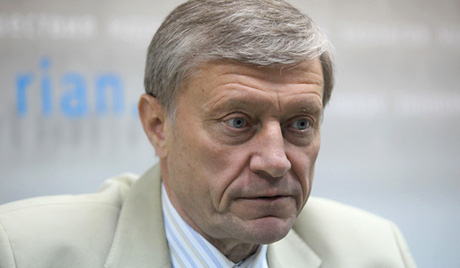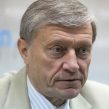
Russian-US Military Competition in Central Asia Threatens to Compromise Regional Security
Publication: Eurasia Daily Monitor Volume: 10 Issue: 50
By:

Following his recent visit to Brussels, the secretary general of the Collective Security Treaty Organization (CSTO), Nikolai Bordyuzha, told the Russian press that the North Atlantic Treaty Organization (NATO) had been ignoring all attempts to establish a permanent dialogue on security issues common to both organizations. According to Bordyuzha, who has been in charge of the CSTO since April 2003, this disinterest comes from the fact that NATO’s leadership not only does not wish to recognize the Russian-led alliance’s sphere of responsibility for Central Asian security affairs, but also the regional economic realities leading to a gradual progress toward the establishment of a Eurasian Union. In Bordyuzha’s words, the two organizations could effectively cooperate on 10 or 11 joint projects, specifically singling out the problem of drug-trafficking from Afghanistan. Yet, no cooperation has taken place in spite of certain modest steps taken back in 2004 (Vzglyad.ru, February 28).
This declaration comes at a time when Russia’s bilateral relations with some Central Asian states have become particularly strained. Uzbekistan’s decision to withdraw from the CSTO, having already left the alliance once in 1999 only to join it again in 2006, was announced by the Uzbekistani Foreign Ministry last June and was quickly followed by the adoption of a new foreign policy strategy that reinforced the country’s neutrality and refusal to host foreign bases or be part of any military alliances. Yet, according to Vladimir Kozyulin, a Central Asia expert of the Moscow-based Center for Policy Studies, Tashkent’s move away from its partnership with Moscow could be a signal to Washington about Uzbekistan’s renewed willingness to provide its territory to US soldiers after their rapid departure from the Karshi-Khanabad air base in 2005 (Kommersant.ru, Newsru.ru, June 29, 2012).
During Russian Foreign Minister Sergei Lavrov’s latest visit to Uzbekistan in mid-December 2012, the Central Asian republic’s diplomats reportedly confirmed Tashkent’s commitment to military neutrality, which practically excludes the deployment of any US facility on its soil. However, it still remains to be seen whether Uzbekistan will keep its word considering that its own security is going to be increasingly at risk due to NATO’s upcoming withdrawal from Afghanistan by the end of 2014. Recently, Uzbekistan officially agreed to the transit of International Security Assistance Force (ISAF) troops across its territory, while the country’s armed forces are expected to receive $700,000 worth of military equipment from the United Kingdom and similar compensation from other Western allies. Moreover, Uzbekistan is already suspected of owning US-made drones after a border incident with Kazakhstan in mid-February 2012 (12news.uz, February 14; Rosbalt.ru, December 19, 2012; Tenginews.kz, February 17, 2012).
Russia’s relations with Tajikistan also remain complicated. Although Vladimir Putin’s visit to Dushanbe last September secured Moscow’s continued presence on its military base close to the Afghan border until 2042, the agreement still has to be ratified by Tajikistan’s parliament. Moreover, despite Russia’s role in guaranteeing the small mountainous republic’s stability and security, Dushanbe has been using this situation to its own profit by forcing Moscow to provide preferential conditions for the duty-free import of Russian oil products or with regard to the stay of Tajik labor migrants in Russia. Recently, Tajikistani authorities welcomed US Assistant Secretary of State Robert Blake after Russian Lieutenant-General Valeriy Gerasimov’s visit had been cancelled for unknown reasons. While the possible deployment of a US military base on Tajikistan’s territory continues to be strongly denied by the State Department, Moscow’s military cooperation with Dushanbe looks problematic (Novaya Gazeta, February 20).
As for Kazakhstan and Kyrgyzstan, both countries are considered to be moderately pro-Russian. While Astana and Bishkek have already concluded bilateral agreements for the transit of NATO troops leaving Afghanistan, the small cracks that recently started to appear in the Russian-Kazakhstani relationship (see EDM, October 19, 2012) make Kyrgyzstan a privileged partner. Even though Kazakhstan and Russia are now tied by the bonds of their Customs Union and have proclaimed that the Eurasian Union would be launched on January 1, 2015, Kazakhstan has recently been agitating for more flexibility with regard to the import of refined oil products from Russia. Kazakhstan’s Deputy Prime Minister Kairat Kelimbetov even hinted that his country would be ready to speed up the modernization of its oil refineries with foreign funds to become less dependent on Russia’s will. Despite Kazakhstan’s active role in the CSTO, it still has not authorized any deployments by the Russian armed forces and increasingly tends to rely on external partners for the supply of its military needs. Eurocopter’s new assembly line inaugurated by President Nursultan Nazarbayev in late June 2012, the current problems at the Baikonur launch facility as well as Kazakhstan’s growing defense cooperation with Ukraine leave Russia in a less favorable position (Newskaz.ru, March 3; Rosbalt.ru, November 19; Bnews.kz, June 29, 2012).
At the same time, the Kyrgyz Republic has become the core of Russia’s military ties with Central Asia. In November 2012, Russian authorities said that they were planning to provide $1.5 billion worth of military assistance to Kyrgyzstan and Tajikistan, with over 73 percent of this amount directed to Bishkek. In late February 2013, several Kyrgyzstani newspapers reported that Russia was expecting to build a second military base in Kyrgyzstan’s Osh province, in addition to its Kant airbase located on the outskirts of Bishkek. According to the local press, a base project is currently under consideration in President Putin’s office. Finally, Russia’s transportation ministry has confirmed its intention to assist Kyrgyzstan in renovating the Manas International Airport in order to transform it into a modern logistics center. Concurrently, Washington’s “peace and security” aid package to Kyrgyzstan will grow from $6.3 million to $9.2 million in the 2013 fiscal year, while other Central Asian republics are faced with drastic reductions (TRTrussian.com, March 1; Vecherny Bishkek, February 26; Eurasianet.org, February 22; Lenta.ru, November 6, 2012).
The ongoing military competition in Central Asia, both on bilateral and multilateral levels—involving organizations such as the CSTO and NATO—cannot be but harmful to the common goal of securing the region against potential terrorist and extremist threats from Afghanistan and Pakistan. Despite claims of strengthening state-to-state ties between Moscow and Washington on the one hand, and the regional capitals, on the other, Central Asia’s security situation is in need of a coordinated global approach that has yet to be found. The problem of drug-trafficking remains one of those that could be effectively tackled via a CSTO-NATO cooperation scheme. However, despite Bordyuzha’s accusations, it was Russia that protested against and subsequently blocked the US-inspired Central Asia Counternarcotics Initiative unveiled in February 2012. In this context, both the CSTO and NATO, driven by their core members, should be interested in reconciling their differences and elaborating a common strategy for Central Asia’s peaceful future.




